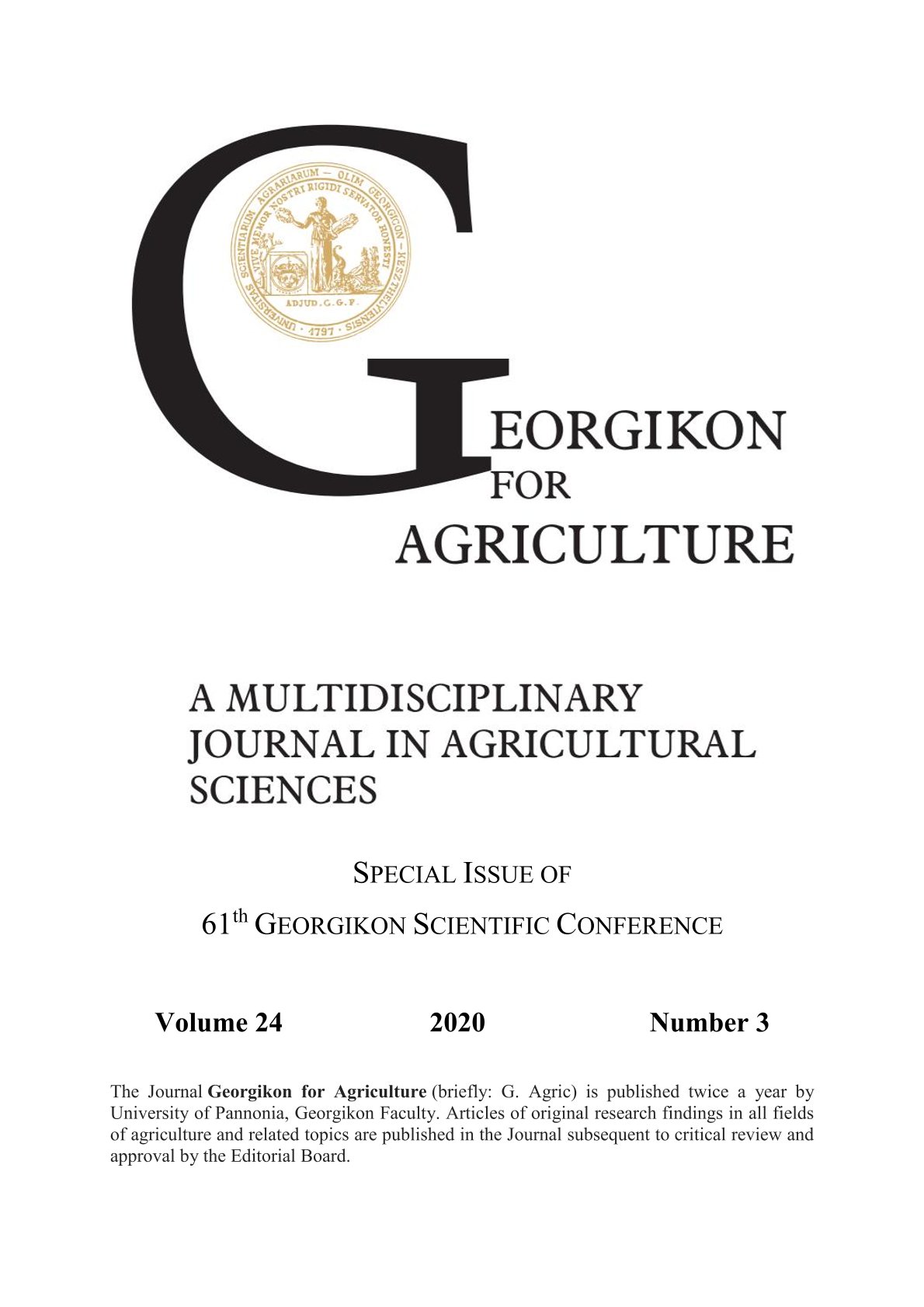Relationship between security and competitiveness in agricultural enterprises in Transdanubia
Keywords:
agriculture, enterprise, motivation, sustainabilty, TransdanubiaAbstract
Despite the risks of starting a business, most entrepreneurs seem to prefer the opportunities included rather than be an employee, as their numbers continue to rise. In many cases, however, it is not just starting a business but maintaining it that poses a real challenge for the entrepreneur. Therefore, the goal of our study is to identify the long-term sustainability of businesses, especially agricultural businesses, since the number of risks in the sector is higher. The quantitative research was carried out in the Transdanubian region by using a questionnaire, the result of which shows that most agricultural entrepreneurs operate as family farms and/or have been inherited. In addition, in-depth interviews were conducted as part of the study, which revealed that domestic professionals see the potential for risk reduction in establishing professional relationships and diversifying their activities. The authors see the opportunity to interconnect security and competitiveness in economic organizations and in the spread of technological innovation, some initiatives of which have already begun.
References
Bai, Z., Caspari, T., Gonzalez, M. R., Batjes, N. H., Mäder, P., Bünemann, E. K., de Goede, R., Brussaard, L., Xu, M., Ferreira, C. S. S., Reintam, E., Fan, H., Mihelic, R., Glavan, M., Tóth, Z. 2018. Effects of agricultural management practices on soil quality: A review of long-term experiments for Europe and China. Agriculture Ecosystems and Environment. 265, 1–7. https://doi.org/10.1016/j.agee.2018.05.028
Benz, M., Frey, B. S. 2008a. Being independent is a great thing: subjective evaluations of self-employment and hierarchy. Economica. 75. 362–383. https://doi.org/10.1111/j.1468-0335.2007.00594.x
Benz, M., Frey, B. S. 2008b. The value of doing what you like: evidence from the self-employed in 23 countries. Journal of EconomicBehavior and Organization. 68. 445–455. https://doi.org/10.1016/j.jebo.2006.10.014
Birkner, Z., Máhr, T. 2016. Interpreting innovation - in another way, Vezetéstudomány - Budapest Management Review, 47(10). 39–50. https://doi.org/10.14267/VEZTUD.2016.10.04
Budapest Bank. 2016. https://piacesprofit.hu/cikkek/kkv_cegblog/sajat-vallalkozasra-vagyik-a-magyar-mar-az-otlete-is-megvan.html (09.09.2019.)
Csákné, F. J. 2012. Családi vállalkozások - fókuszban az utódlás. https://phd.lib.uni-corvinus.hu/660/1/Csakne_Filep_Judit_dhu.pdf (09.09.2019.)
Csiszárik-Kocsir, Á., Fodor, M., Medve, A., Varga, J. 2015. Do we know everything about the financial strategies? Results based on a Hungarian questionnaire research, Macrotheme Review: a multidisciplinary Journal of Global Macro Trends,4/5. 117–136.
Dávid, L., Molnár, Cs., Kosmaczewska, J., Fodor, Gy., Zsarnóczky, M., Varga, I., Palencikova, Z. 2019. Ecoenergy tourism, study into some aspects of relationship between use of relationship between use of renewable energy resources and sustainable regional and rural development. Engineering for Rural Development. 18. 1478–1483. https://doi.org/10.22616/ERDev2019.18.N346
Gáti, M., Bauer, A. 2019. Marketing decision - making in Hungarian SMEs, Trziste / Market, 31/1. 39–52. https://doi.org/10.22598/mt/2019.31.1.39
Hamar, A. 2017. Termelői szervezetek a zöldség-gyümölcs ágazatban és a termelőkkel való kapcsolataik változása. Gazdálkodás. 61(1). 27–41.
Hamza, E., Rácz, K., Szabó, D., Vásáry, V. 2018. Szociális szövetkezetek szerepe a vidéki gazdaságban, avagy a Fókusz Támogatási program megvalósításának eddigi tapasztalatai. Gazdálkodás. 62(3). 245–260.
Kazainé, Ó. A., Kiss, J. 2018. Milyen példát mutatnak a sikeres külföldi exportorientált vállalatok az innováció terén a hazai vállalatok számára? Vezetéstudomány. XLIX/01. 78–86. https://doi.org/10.14267/VEZTUD.2018.01.08
Kismányoki, T., Tóth, Z. 2016. Keszthelyi tartamkísérletek (1964-2014). Növénytermelés. 65(2). 99–104.
Kwon, I. W. G., Suh, T. 2005. Trust, commitment and relationships in supply chain management: A path analysis, Supply Chain Management International Journal, 2005/10, 26–33. https://doi.org/10.1108/13598540510578351
Lukes, M., Stephan, U. 2017. Measuring employee innovation. International Journal of Entrepreneurial Behavior & Research. 23(1). 136–158. https://doi.org/10.1108/IJEBR-11-2015-0262
McMullen, J. S., Shepherd, D. A. 2006. Entrepreneurial action and the role of uncertainty in the theory of the entrepreneur. Academy of Management Review. 31. 132–152. https://doi.org/10.5465/amr.2006.19379628
Molnár, T. 2015. Empírikus területi kutatások, Budapest, Akadémiai Kiadó 207. ISBN: 9789630595981
Noszkay, E. 2017. Tapasztalatok a családi vállalkozások átörökítésének dilemmái kapcsán. Vezetéstudomány. XLVIII/06-07. 64–72. https://doi.org/10.14267/VEZTUD.2017.06.08
Oláh, J., Bai, A., Karmazin, Gy., Balogh, P.. Popp, J. 2017. The Role Played by Trust and Its Effect on the Competiveness of Logistics Service Providers in Hungary. Sustainability. 9(12). 1–22. https://doi.org/10.3390/su9122303
Oslo Manual Guidelines for Collecting and Interpeting Innovation Data, 2005. Third edition, p. 30.
Pintér, G., Hegedűsné, B. N., Wiliams. A., Zsiborács, H. 2018. Study of Photovoltaics and LED Energy Efficiency: Case Study in Hungary. Energies. 11(4). 13–25. https://doi.org/10.3390/en11040790
Porter, M. E. 1985. Competitive Strategy. Boston. Harvard University Press
Poza, E. J., Daugherty, M. S. 2014. Family Business. Mason, OH: South-Western Cengage Learning
Shir, N., Nikolaev, B. N., Wincent, J. 2019. Entrepreneurship and well-being: The role of psychological autonomy, competence, and relatedness. Journal of Business Venturing. 34(5). https://doi.org/10.1016/j.jbusvent.2018.05.002
Stein, J. 2007. What is a business family? Electronic Journal of Family Business Studies, 2(1). 168–185.
Szabó-Szentgróti, E., Szakály, Z., Borbély, Cs., Szabó-Szentgróti, G. 2018. Együttműködések a magyarországi tejfeldolgozó szektorban - egy empirikus kutatás eredményei, Gazdálkodás, 62(5). 406–425.
Szakály, Z., Popp, J., Kontor, E., Kovács, S., Pető, K., Jasák, H. 2017. Attitudes of the Lifestyle of Health and Sustainability Segment in Hungary, Sustainability, 9(10). 1763–1779. https://doi.org/10.3390/su9101763
Szőke, V., Kovács, L. 2019. Mezőgazdasági (növénytermesztési) anyagmozgatás és közlekedési hálózatok struktúrájának és terheltségének összefüggései Vas megye példáján. In: Kovács, L., Varga, I. (szerk.) A gazdaság interdiszciplináris megközelítései. Szombathely, Magyarország: Savaria University Press. 93–116.
Ványi, N. 2018. A gyümölcstermelők üzleti kapcsolatainak értékelése a kapcsolati minőség tényezői alapján, Gazdálkodás, 62(3). 261–272.
Verhees, F. J. H. M., Meulenberg, M. T. G. 2004. Market orientation, innovativeness, productinnovation, and performance in small firms, Journal of Small Business Management, 42(2). 134–154. https://doi.org/10.1111/j.1540-627X.2004.00102.x
Zsiborács, H., Hegedűsné, B. N., Vincze, A., Háber, I., Weihs, P., Oswald, S., Gützer, C., Pintér, G. 2019. Changes of Photovoltaic Performance as a Function of Positioning Relative to the Focus Points of a Concentrator PV Module: Case Study. Applied Sciences-Basel, 9(16). 3392–3410 https://doi.org/10.3390/app9163392
Downloads
Published
Issue
Section
License
Copyright (c) 2020 Göllény-Kovács Nikoletta, Németh Kornél, Péter Erzsébet

This work is licensed under a Creative Commons Attribution-NonCommercial-NoDerivatives 4.0 International License.
Cikkre a Creative Commons 4.0 standard licenc alábbi típusa vonatkozik: CC-BY-NC-ND-4.0. Ennek értelmében a mű szabadon másolható, terjeszthető, bemutatható és előadható, azonban nem használható fel kereskedelmi célokra (NC), továbbá nem módosítható és nem készíthető belőle átdolgozás, származékos mű (ND). A licenc alapján a szerző vagy a jogosult által meghatározott módon fel kell tüntetni a szerző nevét és a szerzői mű címét (BY).




